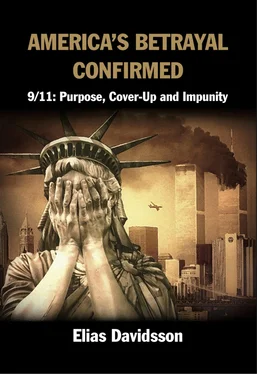A year later, President Bush Sr. transmitted to Congress his report on the “national security strategy,” which reflected the “dramatic changes in the international environment” and observed that the United States had reached a “moment of historic opportunity.”{30}
Dick Cheney acknowledged at the time the unique window of opportunity that the U.S. could seize:
We have, in fact, won great depth for our strategic position. The threats to our security have become more distant, not only physically but in time as well. A challenger to our security would have to overcome our formidable alliances and their qualitative advantages that we displayed so impressively in Desert Storm...It is improbable that a global conventional challenge to US and Western security will emerge from the Eurasian heartland for years to come.{31}
Indeed, at the time this statement was made, no state or group of states could have conceivably challenged the supremacy of the United States. Assuming an unrelenting ascendance of China’s economic and military power, the U.S. faced at the time a window of opportunity of 20 years or more to entrench and consolidate its global hegemony. For U.S. leaders there was no time to lose if they were to seize upon this opportunity.
Lawrence Korb, vice president of the Council on Foreign Relations and former Assistant Secretary of Defense in the Reagan administration 1981-1985, also recognized the time-limited window of opportunity:
[W]hat we have to do right now is maintain stability in the international environment. The military is one of those devices that we have to do that. We have no peer competitor right now. [...] Could we have some in 10 to 15 years? Sure, we could, but we don't have anybody right now.{32}
Observers such as Andrew J. Bacevich warned early on against wasting opportunities: “[W]e would be ill-advised to waste the opportunity for strategic reassessment imparted by our Cold War triumph. Such opportunities are fleeting and we waste them at our peril.”{33}
But was the U.S. really wasting opportunities? In 1990, the United States had already availed itself of its newly gained supremacy to secure the adoption by the U.N. Security Council of a series of resolutions that imposed on the Iraqi people the most draconian economic sanctions in modern history, and authorized any willing State to use “all means” to force Iraq to withdraw from Kuwait. It was clearly understood by the U.N. membership that the innocuous expression “all means” was not a figure of speech. It was promptly translated by the United States and its allies into a devastating bombing campaign against Iraq’s civilian infrastructure that brought the country back to the pre-industrial age.{34} When the representative of Yemen announced that he would oppose the resolution, the United States immediately retaliated by withholding desperately needed financial aid to that country.{35} The United States thus was already demonstrating that it would not permit any challenge to its supremacy.
After 9/11, it became easier to speak of opportunities. Donald Rumsfeld told the New York Times on 12 October 2001, that now “Maybe […] the world will sufficiently register the danger that exists on the globe and have this event cause the kind of sense of urgency and offer the kind of opportunities that World War II offered, to refashion much of the world.”{36}
(4) The benefits of an external threat
The notorious Nazi leader Hermann Goering believed that any population can be induced to support war if presented with the perception of a credible external threat. During the war crimes trial at Nuremberg (1946), psychologist Gustave Gilbert visited Goering in his cell. Gilbert wrote in his diary, later published in book form:
We got around to the subject of war again and I said that, contrary to his attitude, I did not think that the common people are very thankful for leaders who bring them war and destruction.
Goering answered:
Why would some poor slob on a farm want to risk his life in a war when the best that he can get out of it is to come back to his farm in one piece? Naturally, the common people don’t want war, either in Russia or in England nor in America, nor for that matter in Germany. That is understood. But, after all, it is the leaders of the country who determine the policy and it is always a simple matter to drag the people along, whether it is a democracy or a fascist dictatorship or a Parliament or a Communist dictatorship…That is easy. All you have to tell them is that they are being attacked and denounce the peacemakers for lack of patriotism and exposing the country to danger. It works the same in any country.{37}
George Kennan, American diplomat, historian and expert on Soviet policies, expressed a similar idea long ago:
Were the Soviet Union to sink tomorrow under the waters of the ocean, the American military-industrial establishment would have to go on, substantially unchanged, until some other adversary could be invented. Anything else would be an unacceptable shock to the American economy.{38}
British political commentator Andrew Marr expressed in 1993 what few in Europe dared to say in public, namely that “fear holds the key to the future of NATO.” This was actually the title of his article in the Independent (London). He wrote:
Military alliances are as keen as anyone to cloak themselves in happy-clappy idealism. But they are not kept together by that: they are cemented and underpinned by fear. NATO, whose foreign ministers met yesterday before its summit in January, is searching for a role in the language of democracy and fraternity. But what it really needs to thrive are more fear-soaked nightmares among its people.{39}
Author Webster G. Tarpley explains how a perceived external threat provides cohesion to societies, particularly those ruled by an oligarchy:
It is from [Carl] Schmitt that Samuel Huntington got his idea that an enemy image is absolutely necessary for the cohesion of any society. In reality, however, it is primarily an oligarchical society which requires an enemy image, because that society is based on an irrational principle of domination which cannot stand the scrutiny it would receive in peacetime. George Orwell understood this aspect well when he suggested in 1984 that the endless war among Oceania, Eurasia, and Eastasia was really a war waged by each of these states against its own population, for the purpose of perpetuating a hierarchical society.{40}
(5) Searching for a new adversary
As the Soviet Bloc disintegrated, Western strategists began looking for a new threat perception that would provide the Western alliance with a long-term focus for foreign policy. In his book, aptly called A Search for Enemies, published in 1991, Ted Carpenter wrote:
Since the Soviet Union’s East European empire began to unravel in the summer of 1989, Bush administration officials and numerous members of the foreign policy community have conducted a frantic search for alternative justifications for the [Atlantic] alliance. The range of suggestions NATO’s supporters have made is testimony to both their creativity and their desperation.{41}
At the time his book was published, the ruling elite in the U.S. had not yet openly identified a threat that could credibly replace that of the Soviet Bloc:
The best they have been able to come up with on short notice is the need to keep the bulk of Washington’s security commitments intact to guard against instability, unpredictability, and uncertainty. Such vague “threats” obviously lack the visceral impact or credibility of a large expansionist enemy such as the Soviet Union.{42}
Robert W. Tucker, writing already in 1990 in Foreign Affairs, pointed out that to maintain the Western alliance, “a new adversary must be assumed.”{43}
Читать дальше












